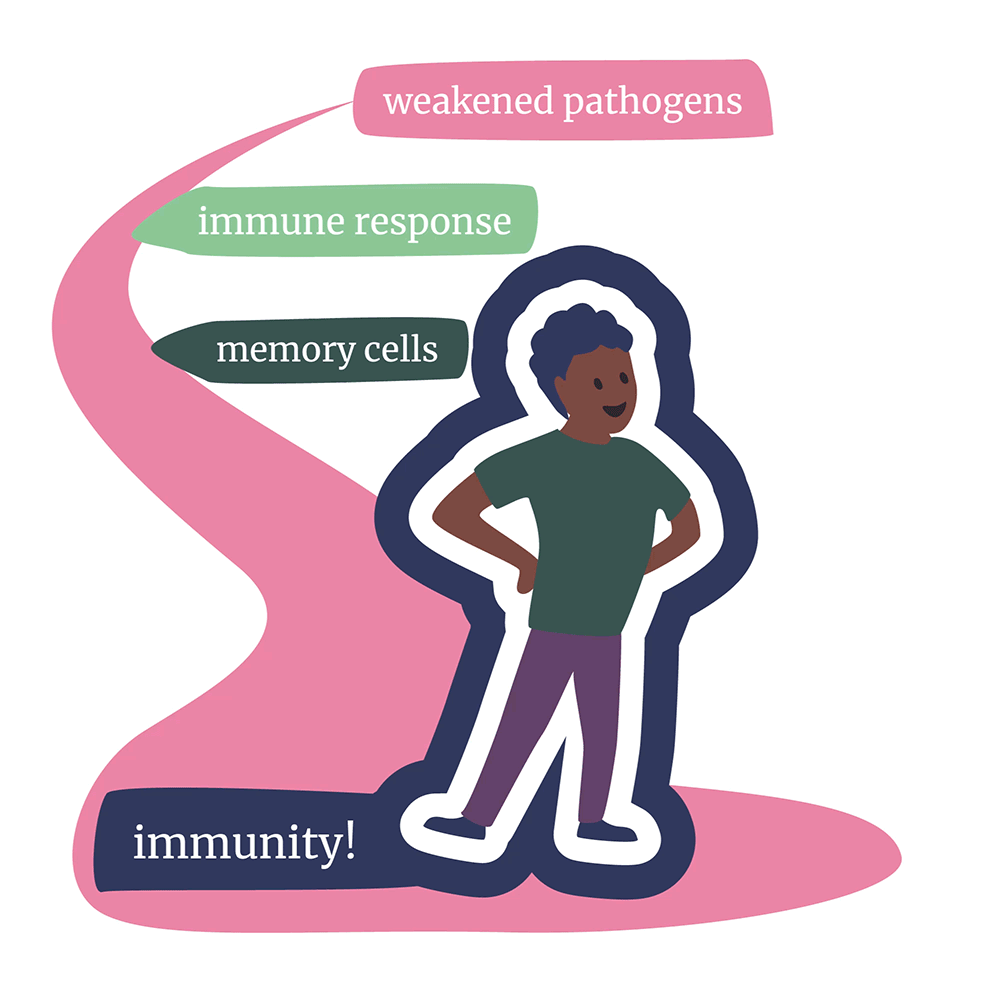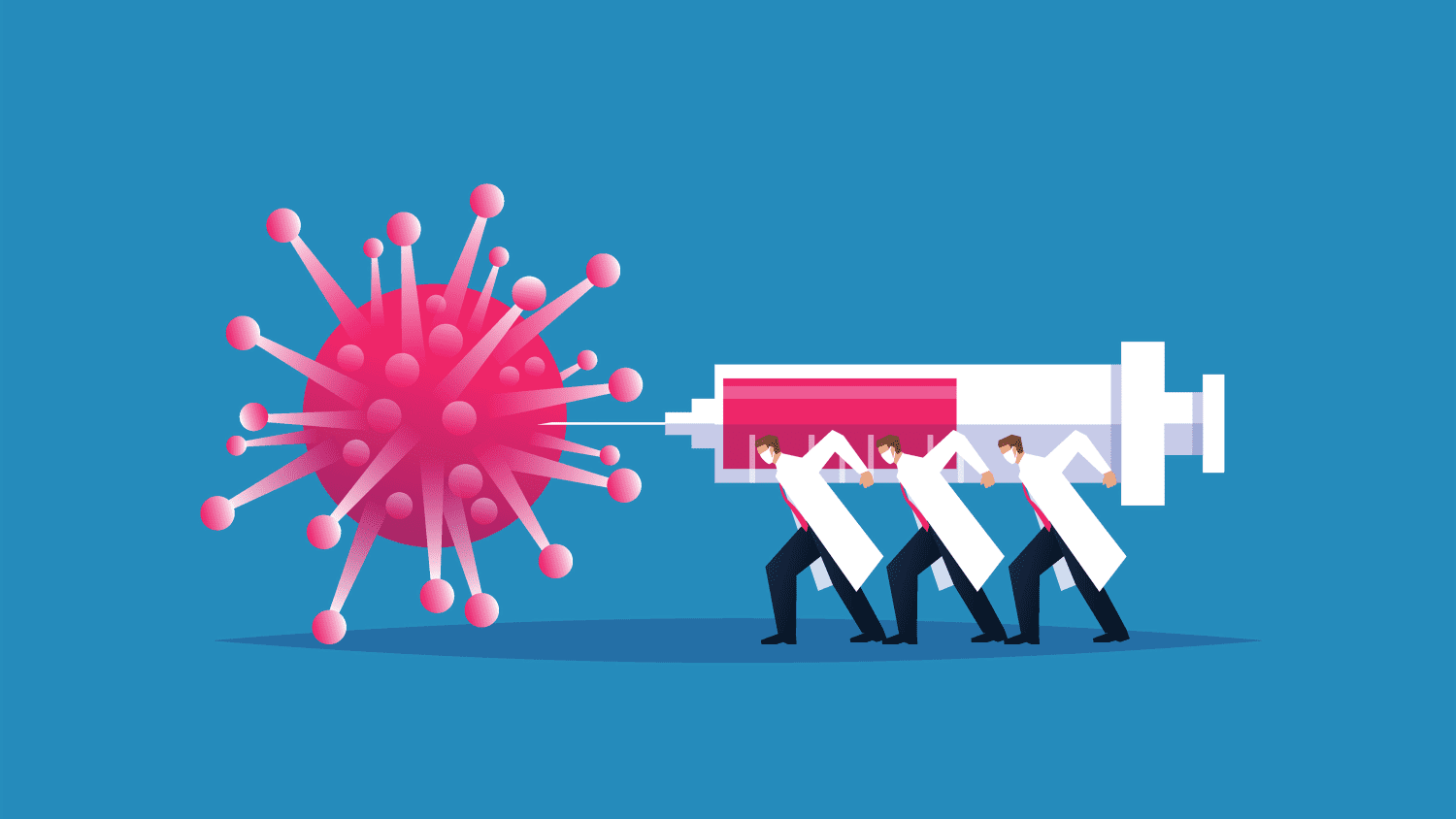
These antigens act to trigger the body's natural immune response but without. The mrna in the vaccine teaches your cells how to make copies of the spike protein. By alice park february 24, 2021 5:00 pm est i t's one thing to test a vaccine, and another. Vaccines help prepare the body to fight foreign invaders (pathogens such as bacteria or viruses), to prevent infection. All vaccines introduce into the body a harmless piece of a particular bacteria or virus, triggering an immune response. Vaccines work, comparison of cases and deaths of vaccine preventable diseases both before and after advent of vaccines, prevaccine morbidity and most recent morbidity, view of the effect of vaccines on cases and deaths of vaccine preventable diseases, p4037 created date: They then leave behind memory cells that can instigate a defense should the pathogen return. Most people who get vaccinated will have immunity (protection) against the disease. These three vaccines do work to prevent disease and the spread of disease, and they are as safe as any other vaccines that have been in use.
How vaccines help vaccines contain weakened or inactive parts of a particular organism (antigen) that triggers an immune response within the body. They then leave behind memory cells that can instigate a defense should the pathogen return. The immune system is a network of cells, tissues and organs that work together to help fight off infection from harmful bacteria or viruses. This causes your body to create antibodies. An mrna vaccine works a little differently than most other vaccines that are available to us, such as a more traditional mechanism of vaccination for the measles or the flu or chickenpox.

By alice park february 24, 2021 5:00 pm est i t's one thing to test a vaccine, and another.
If you want to learn more about how vaccines work, we have a wide variety of relevant courses available to help. The vaccine is in use in russia and is authorized. Vaccines work vaccines are very effective — and they're the best protection against many serious diseases. Vaccines introduce small parts of germs that are weakened or dead, collectively called antigens, to our body. This causes your body to create antibodies. Vaccines work by teaching your body to recognize specific dangerous pathogens so your immune system is prepared to fight off that infection in the future. How vaccines help vaccines contain weakened or inactive parts of a particular organism (antigen) that triggers an immune response within the body. All vaccines introduce into the body a harmless piece of a particular bacteria or virus, triggering an immune response. Vaccines work, comparison of cases and deaths of vaccine preventable diseases both before and after advent of vaccines, prevaccine morbidity and most recent morbidity, view of the effect of vaccines on cases and deaths of vaccine preventable diseases, p4037 created date: Most people who get vaccinated will have immunity (protection) against the disease. These molecules are called antigens, and they are present on all viruses and bacteria. It cannot change your dna in any way. To do this, certain molecules from the pathogen must be introduced into the body to trigger an immune response. Most vaccines contain a weakened or killed bacteria or virus.
Most vaccines contain a weakened or killed bacteria or virus. Although some side effects have been reported, these. These types of studies are called vaccine effectiveness studies. If you get a vaccination and then come into contact with the bacteria or virus (germ) that causes the disease, your immune system will recognise it and be able to protect you by producing the right antibodies. Specific immunity & vaccines … skip to main content menu How vaccines work vaccines help develop immunity by imitating an infection. Vaccines work well to protect you. To do this, certain molecules from the pathogen must be introduced into the body to trigger an immune response. Vaccines work vaccines are very effective — and they're the best protection against many serious diseases.

Specific immunity & vaccines … skip to main content menu
These types of studies are called vaccine effectiveness studies. It cannot change your dna in any way. Different types of vaccines work in different ways to offer protection. Vaccines work, comparison of cases and deaths of vaccine preventable diseases both before and after advent of vaccines, prevaccine morbidity and most recent morbidity, view of the effect of vaccines on cases and deaths of vaccine preventable diseases, p4037 created date: Perhaps you've had one of the two vaccine doses but heard that you may feel under the weather the day after that second shot and are putting it off. The mrna in the vaccine teaches your cells how to make copies of the spike protein. This causes your body to create antibodies. How the gamaleya vaccine works. Most vaccines contain a weakened or killed bacteria or virus. Although some side effects have been reported, these. To do this, certain molecules from the pathogen must be introduced into the body to trigger an immune response. An mrna vaccine works a little differently than most other vaccines that are available to us, such as a more traditional mechanism of vaccination for the measles or the flu or chickenpox. Specific immunity & vaccines … skip to main content menu Sometimes, after getting a vaccine, the imitation infection can cause minor symptoms, such as fever.
How vaccines help vaccines contain weakened or inactive parts of a particular organism (antigen) that triggers an immune response within the body. How the gamaleya vaccine works. Vaccines work vaccines are very effective — and they're the best protection against many serious diseases. This causes your body to create antibodies. Newer vaccines contain the blueprint for producing antigens rather than the antigen itself. How vaccines work vaccines help develop immunity by imitating an infection. After vaccination, your immune cells begin making the s protein pieces and displaying them on cell surfaces. Vaccines work well to protect you. It cannot change your dna in any way. They then leave behind memory cells that can instigate a defense should the pathogen return.

Typically, those either use a weakened.
Vaccines work by teaching your body to recognize specific dangerous pathogens so your immune system is prepared to fight off that infection in the future. A vaccine works by training the immune system to recognize and combat pathogens, either viruses or bacteria. If you get a vaccination and then come into contact with the bacteria or virus (germ) that causes the disease, your immune system will recognise it and be able to protect you by producing the right antibodies. If you are exposed to the real virus later, your body will recognize it and know how to fight it off. Perhaps you've had one of the two vaccine doses but heard that you may feel under the weather the day after that second shot and are putting it off. If you want to learn more about how vaccines work, we have a wide variety of relevant courses available to help. After vaccination, your immune cells begin making the s protein pieces and displaying them on cell surfaces. The mrna in the vaccine teaches your cells how to make copies of the spike protein. Vaccines work, comparison of cases and deaths of vaccine preventable diseases both before and after advent of vaccines, prevaccine morbidity and most recent morbidity, view of the effect of vaccines on cases and deaths of vaccine preventable diseases, p4037 created date: The immune system is a network of cells, tissues and organs that work together to help fight off infection from harmful bacteria or viruses. Coronaviruses have a spikelike structure on their surface called an s protein. How does the vaccine work? An mrna vaccine works a little differently than most other vaccines that are available to us, such as a more traditional mechanism of vaccination for the measles or the flu or chickenpox. Most people who get vaccinated will have immunity (protection) against the disease. By alice park february 24, 2021 5:00 pm est i t's one thing to test a vaccine, and another.
How vaccines work vaccines help develop immunity by imitating an infection vaccines. Although some side effects have been reported, these.

Newer vaccines contain the blueprint for producing antigens rather than the antigen itself.

By comparison, flu vaccines are about 40% effective, on average.

By alice park february 24, 2021 5:00 pm est i t's one thing to test a vaccine, and another.

These types of studies are called vaccine effectiveness studies.

In the clinical trials, half the people got the coronavirus vaccine and half got the placebo.

By alice park february 24, 2021 5:00 pm est i t's one thing to test a vaccine, and another.

These antigens act to trigger the body's natural immune response but without.

How the gamaleya vaccine works.

Sometimes, after getting a vaccine, the imitation infection can cause minor symptoms, such as fever.

A vaccine works by training the immune system to recognize and combat pathogens, either viruses or bacteria.

Vaccines work by teaching your body to recognize specific dangerous pathogens so your immune system is prepared to fight off that infection in the future.

This causes your body to create antibodies.
/cdn.vox-cdn.com/uploads/chorus_asset/file/22408006/mm7013e3_COVIDVaccineFieldEffectiveness_IMAGE_29Mar21_v2_1200x675_medium.jpeg)
If you get a vaccination and then come into contact with the bacteria or virus (germ) that causes the disease, your immune system will recognise it and be able to protect you by producing the right antibodies.

They then leave behind memory cells that can instigate a defense should the pathogen return.

Sometimes, after getting a vaccine, the imitation infection can cause minor symptoms, such as fever.

How vaccines work vaccines help develop immunity by imitating an infection.

A vaccine works by training the immune system to recognize and combat pathogens, either viruses or bacteria.

It cannot change your dna in any way.

Typically, those either use a weakened.

After vaccination, your immune cells begin making the s protein pieces and displaying them on cell surfaces.

How the gamaleya vaccine works.

Coronaviruses have a spikelike structure on their surface called an s protein.

All vaccines contain ingredients that help your immune system make antibodies (proteins that fight off infection and disease).

Perhaps you've had one of the two vaccine doses but heard that you may feel under the weather the day after that second shot and are putting it off.

Most vaccines contain a weakened or killed bacteria or virus.

Vaccines work by teaching your body to recognize specific dangerous pathogens so your immune system is prepared to fight off that infection in the future.

Ben garman, medical director at the notre dame wellness center, to explain how mrna vaccines work.

An mrna vaccine works a little differently than most other vaccines that are available to us, such as a more traditional mechanism of vaccination for the measles or the flu or chickenpox.

Newer vaccines contain the blueprint for producing antigens rather than the antigen itself.

Vaccines help prepare the body to fight foreign invaders (pathogens such as bacteria or viruses), to prevent infection.
In the clinical trials, half the people got the coronavirus vaccine and half got the placebo.

By alice park february 24, 2021 5:00 pm est i t's one thing to test a vaccine, and another.
All vaccines introduce into the body a harmless piece of a particular bacteria or virus, triggering an immune response.

If you are exposed to the real virus later, your body will recognize it and know how to fight it off.

Ben garman, medical director at the notre dame wellness center, to explain how mrna vaccines work.